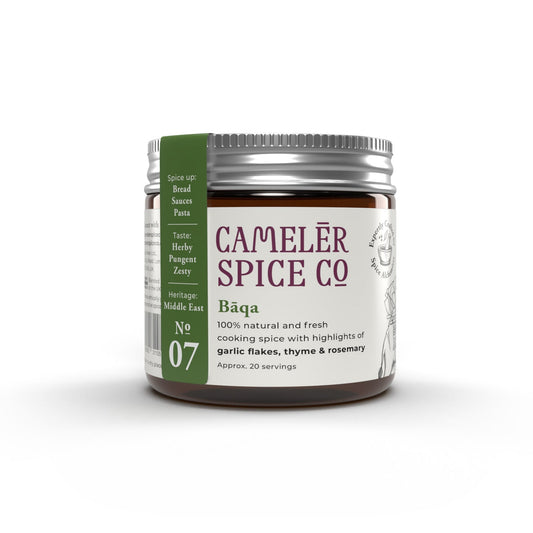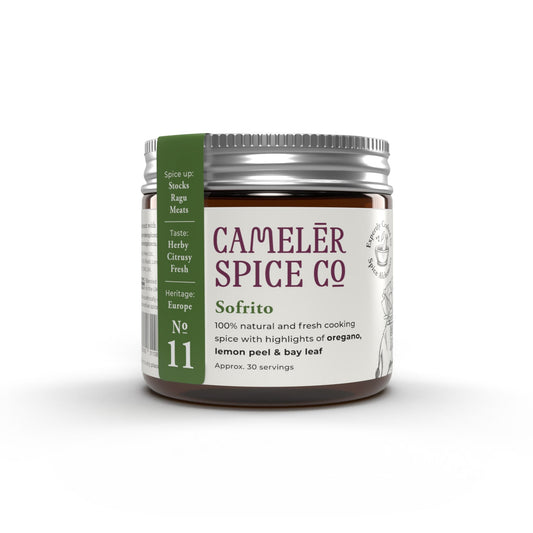
Collection: Onion
(In dry format is known as Onion Flakes, Onion Powder. Onions can have alternative names such as Scallions, Shallots, Cebollitas, Spring onions, Salad Onions, Cibule, and Cipolla. These names can be dependent on type, context, and regional variations.)
What does onion taste like?
Strong, tangy, and loaded with umami flavour, the onion is a distinct staple in our diets, and there are 21 varieties! A member of the Amaryllidaceae family, this aromatic vegetable sits alongside garlic, shallots, leeks, and others. Onions as a staple date back to prehistoric diets, which originated in the Iran and Pakistan region. Onion flakes and powder are popular for salad dressings, soups, and meat rubs.
What flavours go with onion?
- Beetroot
- Bell Pepper
- Cabbage
- Carrot
- Celery
- Clove
- Cucumber
- Garlic
- Mint
- Mushroom
- Nutmeg
- Orange
- Pea
- Potato
- Rosemary
- Sage
- Thyme
- Tomato
Dehydrated onion powder is much more concentrated than fresh onion. For this reason, you should be careful when using it as a single spice in a recipe. (You would need 20% of the powder form in ratio comparison to a fresh onion. It is a good demonstration of how it takes a lot of time to develop a blend with onion powder in its formula. That being said, it is common in various cuisines around the world. Our herby and pungent 13th-century blend Baqa is full of flavours like garlic, rosemary, and thyme making the best cheese toastie.
What are the health benefits of onions?
Onion powder is low in calories but high in nutrients and vitamins. It is a great source of potassium, magnesium, and calcium. It is considered great for blood pressure regulation and bone and immune health.
What are interesting facts about onions?
- The Cretans and the Greeks hang onions on New Year's Eve doors to signify rebirth and regrowth. Because the onion can continue to grow after it has been uprooted, locals believe that some of the plant's good luck and resilience should rub off on them. On New Year’s Day, you may get hit on the head with an onion to get you up for church. Now we know that onions might make you cry for two reasons.
- The Egyptians believed that onions would give you eternal life because of the circles within a circle. Pharaoh Ramses IV was buried with onions in his eye sockets. Various Egyptian tombs with mummies have been found with remnants of onions. The Pyramids have displayed still-life paintings with onions on altars depicting their offerings to the Gods.
- The Indians worshipped onions as early as the 6th Century, using them as a cure for digestion, heart, eyes, and joints.
- The ancient Greeks used onions as a symbol of strength - they would eat them, drink onion juice, and rub themselves in onions.
- During the Middle Ages, Europeans used onions as wedding gifts and as payments for rent.
- Native Americans had a trio of uses for onions: as a poultice, a dye, and even a toy.
- Although it is considered a stereotype, the French wearing onions rose to prominence with British caricature depictions. However, French nationals have been known to wear berets and onions between the 1800s and mid-1900s as they cycled around their regions.
What is the chief flavour compound of onions?
Allicin: (sulphurous, spicy, and hot) The onion smell comes from the sulphur flavour compounds.
Why do onions make you cry?
When an onion gets bruised or chopped, it releases the alliinase enzyme, which is part of the aroma compound. Onion flavours can be complex because of variety and the sulphur content of the soil they grew in, giving different levels of intensity. The allicin compound of onions complements chilli and asafoetida spice.
Onion nutritional facts
For a detailed breakdown of the nutritional values of this product, including calorie content, macronutrients, and other key details, please refer to the attached nutritional information sheet. This information is also available on our jars, with allergens highlighted in bold




